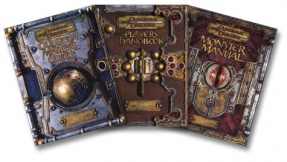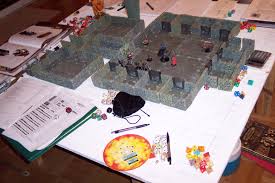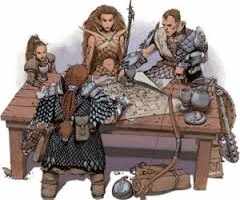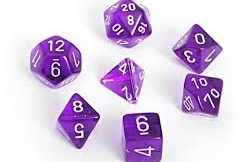Dungeons & Dragons: An Educational RPG

“My greataxe swings down on the goblin dealing seven damage”. It is not uncommon to hear someone say things like that while playing or observing a session of Dungeons & Dragons. Like a family heirloom or a sacred artifact the game’s dice and books are often handed down from the previous generation or shared among friends. Yet, there are still those among the general population that consider the game a waste of time, a form of devil worship, or even a game that entices the players into insanity, leaving them unable to distinguish reality from imagination. Those who have never played sometimes stereotype the players as pale-skinned fiends in the basement of their parents’ home constantly snacking on chips and drinking soda. But there are many positive aspects to the game that many choose to reject and never evaluate Dungeons & Dragons for what it really is – an educational experience.
Dungeons & Dragons was first played and created by Gary Gygax and Dave Arneson and was first published back in 1974. Based on their interest in war games the two developed Dungeons & Dragons to apply to players on a personal level. The game is moderated by the dungeon master, “DM”, who decides to build the world from scratch using the supplemental books or the DM uses a generated adventure already published. The fantasy role-playing tabletop game focuses on storytelling and is limited only by the imagination of the players and the DM. Exploring dungeons, mediating political situations, solving puzzles, fighting monsters, and gathering treasure are just some of the things people can do when playing the game. Although the focus is on entertainment and using imagination to drive the story forward much of the game’s mechanics and functions promote educational skills that are vital to developing younger players and older players alike. Dungeons & Dragons gives the players an avenue to improve skills such as reading and writing, basic mathematics, critical thinking, problem solving, and teamwork that otherwise are lost in day-to-day life.
Reading and Writing

As a beginner to the game a player is tasked with getting familiarized with the basic fundamentals and how to create a character. This involves massive amounts of reading and writing to become acquainted with the rules and procedures for creating and maintaining a player character. Once a character is created the goal of the players is to level these characters and gain new abilities and skills. Some players may choose to play a character that casts spells while others may strive to be a melee character. Whichever path, the player must decide how to build their character to meet their goals.
The amount of work required to craft a character exercises a person’s reading skills because of the complexity of character creation. For example, once a player chooses a race (dwarf, elf, human, halfling, etc.) and class (fighter, rogue, wizard, cleric, etc.) certain skills and feats fit certain classes and races better than others. So a person playing as a rogue may choose to put skill points into hide, move silently, and climb which would focus on the strengths of the rogue – to be stealthy and agile. Feats are like skills but enhance the character further and create a stronger sense of specialization. Does a player want their rogue to fight with two hands or one? Does a player want to fight from a distance or in close quarters? These are just a few examples of the complexity of character creation and because of this complexity the player is required to continue to read the books to gain knowledge about what their character can do.
For a player to become attached to their character the role-playing aspect of the creation process adds a bit of flavor to the game. Players are encouraged to write background information for their characters which may include where they come from, how they look, family history, personality traits, etc. This character biography helps players flex their creative writing muscles and builds a bond between player and character. Not only are writing skills used creatively but critically as well. Some DMs encourage players to keep notes of quests, characters, and other bits of information to help the players learn and interact with the world around them. The importance of reading and writing begins at character creation and continues as the players level their characters, allowing them to choose new feats, increase skills, and learn about their world.
Critical Thinking and Problem Solving

Once characters are created the players are finally able to explore an already created world by using supplements from Dungeons & Dragons or they make their way through an adventure that is published. Players will come across monsters, quests, treasure, as well as towns and cities while exploring the world around them. This part of the game requires role-playing with the dungeon master and fellow players. This role-playing rouses the imagination and helps players build social skills and problem solving skills to complete tasks. For example, these tasks may involve coercing a non-player character to help the players carry out a duty, gain information or just simply solving a puzzle in the game. These problem solving and social skills are essential to developing people, especially if the players are in their early and mid-teens.
For example, the players may come across a puzzle located in the bottom of a dungeon. To open a door they must solve a riddle or perhaps find another path to their destination. These puzzles and roadblocks give the players a chance think critically about their environment, information they have gained, and give the players the opportunity to work together to complete a quest that they would not be able to finish alone.
Teamwork

In addition to building problem solving and critical thinking skills Dungeons & Dragons promotes another important aspect of social interaction – teamwork. Arguably the most important social skill the game helps build, teamwork is at the core of the game and is vital to allow the game to run its course. Teamwork is important because each player’s character has special skills that make them ideal for certain tasks. Some characters are stealthier than others and make great spies and rogues. Other characters are strong and bulky and do well in melee to absorb damage that could otherwise destroy another player’s character. And some characters use magic to change the tide of battle in their favor. No matter what a character’s role the player quickly realizes that often they need their allies to carry out tasks that benefit the group.
For instance, the players may find that they are to make their way past a blockaded door or that they must find a way into a guarded keep. The blockaded door is very strong, ruling out the possibility that a weaker character would be able to break it down. However, if two characters work together to open the door they have better chances of succeeding. For the players to get into the guarded keep they might have options like breaking in, sneaking in, or using diplomacy to get into the keep. No matter what direction they choose the players must work together to complete their goals. Like critical thinking and problem solving, teamwork is an essential part of the game that comes naturally and is used frequently without players realizing that they are participating.
Mathematics
Not only does Dungeons & Dragons promote critical reading, writing, problem solving and social interaction but the game also requires the continual use of common mathematical skills such as addition, subtraction, division, and multiplication, and sometimes requires players to read tables of information. Based on dice rolls, players use these numerical results in battles for determining success or fail of skill checks, determining randomized items, randomized events, and for moving combat forward. Math is first used in the game when characters are being created to determine ability scores. Melee characters, like fighters, typically have a high number for strength such as eighteen. Having a high strength ability score give the character a better chance of succeeding at physical activities like climbing, jumping, and swimming, while also adding more damage to a character’s attack. A person playing a rogue may choose to have dexterity be the character’s highest ability, which may prevent the character from getting hit often and contributes to skills such as hide, move silently, and balance.

Setting aside the role-playing aspects of Dungeons & Dragons, the role-playing game relies heavily on mathematics for nearly every aspect of fight encounters. For example, to decide what order the players will act in combat requires an initiative roll and is determined through simple math to illustrate how soon a player’s character can act in battle. If a player rolls a higher initiative check than an enemy the player is allowed to act first. Doing most actions inside and outside of encounters requires using a 20-sided die, “d20”, to determine the outcome of the action. Players might use the d20 to bluff to a non-player character about information they desire, to determine if their character is successful at sneaking past an enemy or perhaps to check the success of a climb check over a wall. The d20 is also used to find if the character is able to land a melee or ranged attack on an enemy. A player may roll the d20 to attempt casting some spells and if successful the player is able to roll other dice to determine damage the enemy will receive. Later in the game, when character levels are higher and more damage is being dealt and received, players are required to do math more often. Whether the math is simple like in the beginning of the game or complex like later in the game, the actions that the numbers represent add value to the amount of imagination when acting out scenarios. Players get excited to do the math because the numbers illustrate the amount of damage a character might deal or how much damage the player’s character might receive. At times, mathematics in Dungeons & Dragons really is a matter of life and death for the player’s character.
Educational Value
Dungeons & Dragons is not just a role-playing game, it is an educational RPG. Dungeons & Dragons helps the players build academic skills like reading and writing, basic mathematics, critical thinking, problem solving, and teamwork. These academic skills are important to developing people at a young age. Yet, the positive aspects of Dungeons & Dragons is not only academic but the game requires a large amount of social interaction amongst players. Through normal game progression of the story players are challenged by obstacles that require teamwork and coordination that is comparable to participating on a baseball, soccer, or football team. Dungeons & Dragons promotes skills that any educator strives to teach and build in developing people. The game is beneficial not just for the young but for the old as well. From the younger person that has trouble focusing on academics or struggling to develop social skills to adults that wish to exercise their problem solving and critical thinking skills Dungeons & Dragons may be the answer. So the next time someone around you mentions Dungeons & Dragons, or invites you or your child to take part with others that play, or even the next time you walk past the shelf of books at the local bookstore, think of the academic and social benefits the game offers to all people, young and old alike.
What do you think? Leave a comment.











DnD is highly imaginative and involving. I am trying to learn to play. It is very fun
I have played TONS of computer games, MMOs, etc… NONE of them comes anywhere close to the degree of awesome in a pen and paper game with a good group
one time my party consisted of ,a human fighter who was the embodiment of Catholicism(me),a gypsy like elf spell caster(my best friends girlfriend),a halfling robin hood (my best friend)a dwarfish hippy (my sister),and a greedy gnowm rougue (one of my other pals)
Dungeons and Dragons looks fun. If only I could find people to play it with..
I know that in my area a lot of hobby shops and comic book stores do nights where anyone can come and play D&D, board games, card games, etc. I would suggest trying those locations for D&D.
The rules have become so complicated lately, it’s rather turned me off. 1st and 2nd editions were so easy I didn’t even need a rule book when I DM’ed. To me, the game wasn’t about the rules–rather it was always about a bunch of people coming together and having a fun time on a level you can’t get from a computer. And if you gotta “make up something” along the way to keep it flowing smooth, then so much the better.
I am also a little turned off by 4th edition rules but 3.5 edition is what I grew up with and played. I have heard that Pathfinder is good and I am curious about the new 5th edition as well. I couldn’t agree with you more about the storytelling aspect of the game. Some of the my fondest memories are a product of the sessions I’ve spent playing.
Pathfinder is amazing. It’s everything you love about 3.5 with more customization.
Love the article.
I have been playing D&D forever. When my daughter was struggling with Math in school I broke out my D&D/Pathfinder books and helped her make a character. We played for weeks and the constant adding and subtracting helped her memorize her Math facts and gave her a strong foundation for what she is suing now.
The negative depictions D&D gets hurts me almost as much as comic fans. There is a real basis of history and math in D&D and many players I have encountered are quite intelligent and successful people.
Couldn’t agree with you more. What’s exciting is the fact that the negative depictions of D&D players seems to be leaving pop culture. However, I still occasionally come across a person who has nothing nice to say about D&D, comics, video games, etc. People don’t know what they’re missing until they give it a chance. I’m glad that D&D/Pathfinder helped your daughter get the basics down, that’s exciting! Thanks again too for your help editing, really appreciate it!
I love games that you actually play on a table…and most of must admit that there isn’t any game(if you want to learn all races:) that is harder to learn then the 40k rules….still on today i see nobody wothout the rule book…its impossible to rememver all rules. But i can’t see myself standing behind the table..shouting…like a marine..”hope is the first step on the road of dissapointment”..lol inmagine going to a tabletop battle in a terminator suit…sreeming some stuff about the emperor
young people have no appreciation for D&D!
I think by and large, you are correct. However, I was at Origins last weekend and I saw a lot of under 18 yo, and more than a few 12 and under. I was pleasantly surprised…
16 years old, still playing DnD (yes, 4th Ed) So….all original players that say that young people have no appreciation for it, you’re wrong.
Looks like fun, it’s like acting and playing a kinda board game at the same time.
I think that the philosophy of playing an RPG will lead to such things as Hologram rooms where “readers” can experience by being part of the story just as it is with pad and pencil in modern times playing RPG’s. I love RPG’s!!! Wish I lived in an area where there was more then just me that played. I am the lone wolf in my area. I am disabled so I cannot travel any length of time to the larger cities where there are groups.
If you look into the Pathfinder society, they have online games all the time, I am told… My group, (Guys that I have been playing with since college, WAY to long to admit,) we play over Google Hangouts, since none of us live in the same state anymore.
Where there’s a will… 🙂
It has changed so much. 4th edition made the game too simple, and took too much from the game. Taking away so much of the feel of the game.
D&D is a paper and pencil rpg with a background built by a dedicated gamemaster to assist in the generation and advancement of the players. Without rules, substantial background materials, a gamemaster, and players, there is no game.
I am a DM and proud of the creativity of my group.
I wish I can learn how to play tabletop games. I usually play Magic the Gathering, Yu-Gi-Oh, and now Cardfight Vanguard. On top of that, I play video game RPGs, and I haven’t got a chance to experience table top RPGs yet…
I played D&D back in the late 70’s right thru the 80’s, waiting with anticipation for the postman to arrive with new D&D books and modules, very fond moments playing with mates and that’s what it was all about sharing time with mates.
Damn, I miss playing a good Pen & Paper RPG game.
In my lifetime, D&D started out “underground” -practically unknown. With popularity, it then moved into a phase of being publicly vilified as terminally nerdy (at best) or dangerously infantilizing (at worst). Today it mostly gets fondly nostalgic airplay for having generated a wide range of durable cultural phenomena and derivative works.
I agree. It seems that older generations view D&D as extremely nerdy while the younger generations have not been exposed to that same stereotype, allowing them to have an open mind. Hopefully that trend continues.
Maybe I should give tabletop RPGs a try someday. I like RPG videogames, so maybe tabletop could be enjoyable too.
D&D is something to try if you enjoy RPGs. For me it’s the ultimate form because you are literally acting out a role in the game, not just controlling a digital character.
I’ve played almost all D&D worlds, Ghostbusters RPG, Robotech, Call of Cthulhu, Vampire the Masquerade (and all the other series like Werewolf, Mage, etc)… and the best of all always is D&D
Im just getting into DnD now (next year is my grade 12 year), I have a couple friends that are willing and now all we have to do is actually start. I love the idea of using imagination, it makes it more real. And hey id rather have fun with friends this way then the other teenagers now a days by drinking and getting pregnant. so ya im pretty excited to start dnd
Excellent and thoughtful article. I appreciate the manner in which you outlined all of the educational benefits. The stigma around Dungeons and Dragons is really very sad; DnD is not the anti-social consuming platform that people tend to imagine, but in fact a very social experience. I have played with actors who structure their games almost as long-form improv, and it takes quite the social skills to maneuver through worlds as one in a party of more.
I can totally see the benefits of practicing improvisation during Dungeons & Dragons. It is also fun when the DM throws in some improv dialogue that is unexpected for the players, makes for some interesting conversations!
this brings back memories. I used to play Stormbringer, a paranormal one (can’t remember the name), and TMNT by Palladium books. I still have my dice. Although, I don’t play anymore. I keep my dice in my creative workspace to remind me that it’s important to be sponaneous when you’re telling stories.
The dice are incredibly iconic for Dungeons & Dragons and many other tabletop games, glad to know you still use them for inspiration!
Never played a real D&D , was always curious about it. Remember reading some of the books back in high school , that’s about as close as I came. Just I wouldn’t want to go all hardcore and dress up or anything, But Mansions of Madness will have to scratch that itch for now.
I did not find D&D, or any equivalent to it, until I was in my 30’s. I did, however, introduce my children to it as a form of family fun night. I have to admit to not choosing D&D to do so, but rather the White Wolf system because rankly, I dislike math and I saw this difference as the difference between the US system of measurement and the rest of the worlds Metric system. It was simply easier to deal with multiples of ten than figure out and remember which dice was for what.
Putting that difference aside, the whole genre of table top gaming would never have come about if it had not been for D&D. And while people who have never played may view those who do as the pasty white black framed glasses kids who are too smart for their own good, I have met quite a variety of people who play these games, some fitting that scale of stereotypical nerd, but most do not.
Now that my kids have all moved out, and since I myself have moved, it has been a bit more difficult to find a group of gamers who play the same games as me, with so many different types coming out. But you can always find a D&D game somewhere!
I think one of the most exciting aspects of Dungeons & Dragons is sharing the game with friends and family.
I owned a comic and game store for 15 years, and I spent a great deal of time educating parents on what D&D is and what it isn’t. The postive aspects of role-playing are enormous, particularly the social benefits.
Thank you for this article. Role-playing is a hugely rewarding experience, but the devil-worship scare of the ’80s deeply harmed its reputation and caused needless misunderstandings and fear. Educating people on the benefits of the hobby is important if we’re going to ever move past that superstition. Well done!
I absolutely love the content and angle you chose to approach an article about D&D. I have recently just gotten into D&D and can totally confirm that it is definitely a test of you reading, writing, and discipline. It took me a good two days to read through all of the customization options and create my character, let alone creating my characters back story.
I enjoy how you talked about the educational side of playing this game, because it is 100 percent true. Not only is it true for D&D, but I feel as though a lot of this can be related to many other games out there, although at differently levels of course.
For instance, I would relate 70 percent of the teachings that taught me to read to Pokémon: Red Version.
Great article!
Where did you find the research or evidence to support your claim that the game increases math, critical-thinking, or problem-solving skills?
I want to make and argument that D&D is a good game people should play, but i need hard facts to make my argument strong not just a bunch of people’s opinions.
Thank you for this! I’m doing DnD with students at my school and it’ll be very helpful.
This is my first visit to the Artifice. I Googled up this article because I have been thinking about the educational potential of D&D. I played a lot and did some DMing in the late 1970s when the game first became popular.
This article points out the basic academic and social skills that are used in your average game. I agree that D&D compares favorably with most other games or watching video.
I recall how much detail was included in the prepackaged adventures and how much work designing an adventure entailed.
I can envision adventures with ACT/GRE types of math problems fitted into the game plot. Swinging ropes, catapults, and falling rocks and other “traps” offer opportunities to use algebra, geometry, and trigonometry.
But the challenges don’t stop at math and physics. Magic runes that open doors can be written in languages the players are studying. It seems like a good way to teach words or phrases which have double meanings to fluent speakers but are lost on intermediate speakers.
The explosion of demographic history also offers the potential for rich detail written into the adventure. A little study of early water-wheel powered mills could cut the wood to repair a town’s gate or build a secret network of ladders.
Rather than kill the dragon and take its stolen treasure, why not look to the wealthy merchants as a source of riches. Perhaps a band of orcs are disrupting a trade route? Will the city’s Hanseatic Council pay up after you have delivered the Orc leader’s head? What leverage might your party have over a trade dependent council after the orcs have been disbursed?
This all requires a lot of research, planning, and organizing. If anyone knows of any commercially available adventures that incorporate some of these learning devises, I hope they will email me.
Something that I think is understated is the amount of empathy developed by Dungeons and Dragons. As people fall into the characters they inhabit and engage with I’ve noticed surprisingly genuine emotional connections form between players, their creations, and each other.
Excellent points here! D&D can have such a positive influence on not only our youth (for the educational merits you point out), but on people of all ages. The game is ideal to encourage cross-generational bonds, as players young and old (and in between) can embark on adventures together. I enjoyed the article!